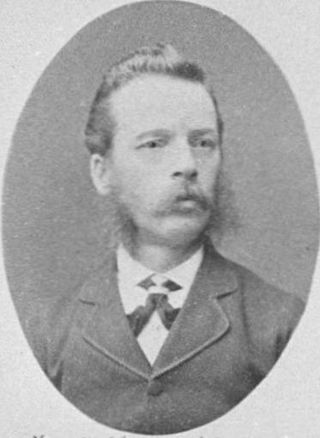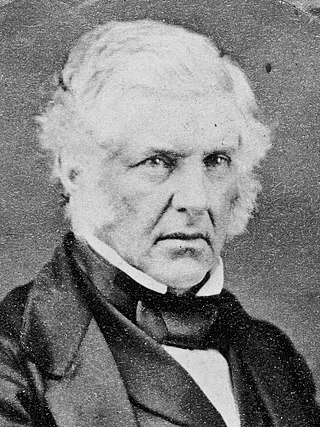| |||||
| Decades: | |||||
|---|---|---|---|---|---|
| See also: | |||||
The following lists events that happened during 1859 in New Zealand.
| |||||
| Decades: | |||||
|---|---|---|---|---|---|
| See also: | |||||
The following lists events that happened during 1859 in New Zealand.
The 2nd Parliament continues.

William Sefton Moorhouse was a British-born New Zealand politician. He was the second Superintendent of Canterbury Province.
The following lists events that happened during 1920 in New Zealand.

Francis Jollie was a politician in New Zealand.
The following lists events that happened during 1867 in New Zealand.
The following lists events that happened during 1862 in New Zealand.
The following lists events that happened during 1856 in New Zealand.
The following lists events that happened during 1855 in New Zealand.
The following lists events that happened during 1854 in New Zealand.
The following lists events that happened during 1853 in New Zealand.
The following lists events that happened during 1851 in New Zealand.
The following lists events that happened during 1850 in New Zealand.
The following lists events that happened during 1842 in New Zealand.
Lyttelton is a former New Zealand parliamentary electorate. It existed from 1853 to 1890, and again from 1893 to 1996, when it was replaced by the Banks Peninsula electorate.
Cheviot was a parliamentary electorate in the Canterbury region of New Zealand, from 1858 to 1890. It was named after what was then one of the country's largest sheep stations, Cheviot Hills.

Edward Brenchley Bishop was the fourth chairman of the Christchurch Town Council, and seven years later the sixth Mayor of Christchurch in 1872–1873. Born in Maidstone, Kent to a wealthy family, his family lived in Belgium during his childhood. He took his father's profession as a distiller and worked in London for 21 years. His sister Susannah emigrated to New Zealand in 1849 and in the following year, many Bishop siblings followed her on the Charlotte Jane, one of the First Four Ships of organised settlement of Canterbury. With his brother Frederick, he had a large farm just south of Christchurch, and the suburb of Somerfield continues to use their farm's name. The brothers were spirit merchants in the city.

Harry Allwright was a 19th-century Member of Parliament in Canterbury, New Zealand. A painter and glazier by trade, he came out with his parents and siblings in the Cressy in 1850, one of the First Four Ships. He took over his father's company in 1859 and became involved in local politics. He first became Mayor of Lyttelton in 1870 and was re-elected seven times. In the 1879 New Zealand general election, he defeated the incumbent and represented the Lyttelton electorate for three parliamentary terms until his own defeat in 1887. He died in 1892.
The New Zealand Constitution Act 1852 authorised the General Assembly to establish new electoral districts and to alter the boundaries of, or abolish, existing districts whenever this was deemed necessary. The rapid growth of New Zealand's European population in the early years of representative government meant changes to electoral districts were implemented frequently, both at general elections, and on four occasions as supplementary elections within the lifetime of a parliament.

The Town of Christchurch by-election in 1860 was triggered by the resignation of Richard Packer as the Member of the House of Representatives for the Town of Christchurch electorate, and occurred during the term of the 2nd New Zealand Parliament. The previous representative of the electorate, the politician Henry Sewell, had returned after three years in England and the general expectation was that Sewell would be the sole contender for election. The Lyttelton Times wrote several provocative editorials, generally endorsing Sewell for his obvious ability, but criticising him for not publicly talking about his policies and plans. Sewell eventually arranged a public meeting the evening prior to nomination day; this was the only public meeting during the election campaign. After a lengthy address, which was favourably received by the Lyttelton Times, a second contender for the office put his name forward at that meeting: the publican Michael Hart. Sewell, a former premier and one of New Zealand's most senior politicians at the time, was successful against the political novice Hart.

The 1865 Town of New Plymouth by-election was a by-election held in the Town of New Plymouth electorate during the 3rd New Zealand Parliament, on 19 May 1865. The by-election was caused by the resignation of the incumbent, Charles Brown, and was won unopposed by Henry Sewell. Whilst Sewell was not a local resident, he was a member of the government through his appointment to the Legislative Council, the upper house of Parliament. Sewell accepted the invitation to represent the electorate, as him becoming a member of the lower house was seen to strengthen the government.
George Arthur Emilius Ross was a New Zealand farmer and provincial politician. A cultured and well-educated man, he suffered a breakdown while at Oxford University and relocated to Christchurch for health reasons before he finished his degree. After a short period as a cadet to learn the basics of sheep farming, he became a major land owner. He was an elected member of the Canterbury Provincial Council for the rural Rakaia electorate and was on the Canterbury Provincial Executive Council on a number of occasions including nearly two years as provincial treasurer. Well-liked as an individual, he was chaotic as a businessman and went bankrupt after a harsh winter in 1867 that caused great loss of stock. He suffered a mental breakdown and disappeared from public life thereafter, with his young wife, Sibella, sustaining the family by running a school that her parents had financed for them. Ross died young aged 48 and his wife outlived him by five decades, bringing up a family of eight children by herself. The West Coast town of Ross was named after him during his lifetime.
![]() Media related to 1859 in New Zealand at Wikimedia Commons
Media related to 1859 in New Zealand at Wikimedia Commons